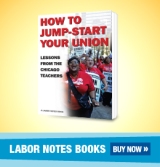by Joe Burns
Many times in discussing labor issues the tendency is to focus on policy issues or major events far removed from the workplace. In Lines of Work: Stories of Jobs and Resistance, a couple dozen workers from the US, Canada and Great Britain, loosely affiliated with the Industrial Workers of the World, seek to turn the conversation in a different direction—to tell stories of work and the workplace. Sometimes they talk about workplace struggles and resistance; sometimes they talk about their jobs and work. There is something refreshing about this approach.
The book contains over thirty chapters with stories ranging from a warehouse worker’s fight against speedup to a clerical worker’s struggle to make her liberal boss at small non-profit understand her class privilege to a liquor store worker’s organizing against sexual harassment. Some of the stories are about organizing campaigns, such as Starbuck workers, others are about personal battles with victories as small as getting workers to celebrate each other’s birthdays over the boss’ objection. All, however, are up close and personal and share a common perspective that talking about time spent at work is important.
Filed under: Book Reviews, Low wage workers, Organizing, Uncategorized | Tagged: IWW, Organizing | 1 Comment »











